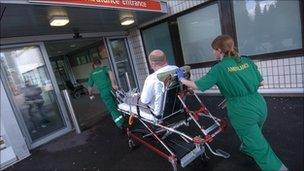Slow ambulance turnarounds cost NHS more than £10m
- Published

The number of hours lost due to turnarounds above 20 minutes has risen by 44%
More than £10m has been lost to the NHS in Wales in the last three years because ambulances are not transferring patients to hospitals quickly enough.
After taking patients to hospital, crews should be ready to answer the next emergency call within 20 minutes.
Research by the BBC shows that tens of thousands of hours are lost when ambulances fail to meet that target.
The Welsh Ambulance Service said it was working to speed up admissions and manage demand.
A Freedom of Information request by the BBC found the total number of hours lost in Wales due to hospital turnarounds above 20 minutes has increased from 37,712 hours in 2008-2009, to 54,476 hours in 2010-2011.
This represents an increase of 44%.
The ambulance service calculates that every hour an ambulance is not in service costs £76.
That would mean that more than £4m was lost in 2010-2011 and more than £10m lost since 2008-2009.
Royal Gwent Hospital, Newport, had the largest number of delays in turnarounds in 2010-2011, with 9,840 hours lost.
Llandudno Hospital lost the fewest with only 22 hours lost from delays in turnarounds in 2010-2011.
An ambulance service spokesperson said: "We are continuing to work with emergency departments to speed up admissions and to manage demand in different ways by developing alternative ways to care for patients and by reminding people of the importance of them choosing the correct services rather than calling 999 as a first option.
"Emergency departments and 999 are emergency services that should only be used when people are badly injured or show the symptoms of serious illness."
Roy Norris, former chair of the Welsh Ambulance Service NHS Trust said: "The real problem is not that the NHS is losing £10m because that £10m is already spent.
"It's about the distress and worry and pain that someone is in simply because an ambulance can't get to them because it's not able to release its previous job."
He added that the job needs to be done within 20 minutes "so that the crew can be released or possibly they may have to sterilise and clean the ambulance.
"Every minute that's lost is a minute that's lost to getting to a patient who needs it."
A Welsh Government spokesman urged people to consider other NHS services in non-emergencies.
He added: "Performance of the ambulance service has improved considerably in recent years thanks to significant investment in new ambulances, technology and equipment.
"Emergency departments across Wales care for more than 60,000 patients every month. We expect all patients to be seen and treated in order of clinical priority.
"Over the last three years, the number of people attending emergency departments has increased by 12% and the number of emergency 999 calls to the ambulance service has increased by 15%."
- Published1 June 2011
- Published25 January 2011